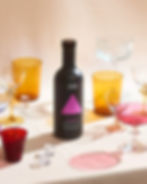The latest news, trends, analysis, interviews and podcasts from the global food and beverage industry
Alternatives to traditional spirits and cocktails have levelled up as discerning consumers demand more from their ‘low and no’ beverages amid the rising moderation trend. FoodBev Media’s Melissa Bradshaw takes a look at how premiumisation and functional ingredients are redefining this space.
Innovation in low and no alcohol alternatives has skyrocketed over the past few years, with research suggesting we have entered the ‘moderation’ era. Mindful indulgence trends, and growing interest in holistic wellbeing since the Covid-19 pandemic, have spurred the low and no movement to dizzying (or, perhaps in this case, sobering) new heights, in contrast with the 2000s drinking culture.
With this shift comes an upsurge in creativity from producers, welcoming in a multitude of new options for conscious drinkers and abstainers alike – no longer will a lemonade or cola suffice for those seeking an enjoyable, alcohol-free experience across typical drinking occasions.
And it is not just abstinence that is shaping this burgeoning segment. Many consumers who continue to drink are rethinking how they do so. Terms like ‘sober curious’ – where individuals question their drinking habits and aim to cut back without fully committing to sobriety – are gaining traction.
Meanwhile, behaviours like ‘zebra striping’ – alternating between alcoholic and non-alcoholic drinks – reflect a growing trend towards mindful sipping.
Jochen Kistner, director of category marketing for beverage EMEA at ADM, said: “Markedly, our research finds that over half of Gen Z and millennials, globally, state they have reduced their consumption of alcoholic beverages to follow a healthier lifestyle”.
Low and no still represents a small, yet growing, fraction of the broader alcohol market – data from IWSR projects alcohol-free’s share of the overall sector will grow to just under 4% by 2027.
The traditional spirits market is still in good health, with the low and no trend not currently posing a significant threat to traditional distillers. On the contrary, we have seen spirits giants such as Diageo embracing the trend. The group recently acquired Ritual Zero Proof, a non-alcoholic spirits
brand established in 2019. Diageo also offers alcohol-free varieties of its traditional spirit brands, including its Tanqueray and Gordon’s gins, and Captain Morgan Spiced Gold rum.
“The growth and innovation of the low and no alcohol category aligns with our Positive Drinking ambitions – this relates to providing choices and inclusive options for consumers,” said Siobhan Hamilton, general manager of innovation for Europe and Africa at Diageo, adding that quality and taste are the number one factors brands must deliver on when it comes to low and no. “No-alcohol brands need to represent high quality and aspiration, not just an alternative for when you are unable to drink.”

Quality upgrade
Beverage formats garnering traction in this space include low and no alcohol seltzers, as well as RTD
cocktails and mocktails.
“Consumers are showing growing curiosity in alternatives to traditional spritz drinks,” noted ADM’s Kistner. “They’re looking for new variations – from low-ABV cocktails to alcohol-free mocktails – both when dining out and in ready-to-drink canned formats available in stores.”
Brands such as Naked Life Spirits, based in Australia and the UK, are leading the charge in the canned low and no cocktail space – a market ripe for innovation as consumers demand higher-quality, healthier alternatives to traditional ‘mocktails’ high in sugar and largely based on fruit juices.
Naked Life offers a range of natural canned cocktails in both ‘Half Naked’ (2.5% ABV) and entirely alcohol-free formats. Its portfolio includes alternatives to traditional spritz cocktails, such as its Italian Spritz, reminiscent of the trendy Aperol Spritz. This blend incorporates extracts and distillates of bitter orange, rhubarb root, cinchona, gentian root and orange blossom, delivering a sweet yet bitter flavour reminiscent of the classic Italian aperitivo.
A focus on premium, high-quality ingredients has become an essential facet of product development for brands offering alcohol-free spirits, aperitifs and RTD cocktails.
Paul Mathew, founder of British non-alcoholic aperitif brand Everleaf, commented: “People are drinking less, but happy to spend more on getting better quality drinks – with or without alcohol”. He added that with the cost of eating and drinking out continuing to rise, consumers rightly expect high-quality offerings when choosing to spend.

Flavour complexity
A mediocre taste, akin to diluted fruit juice or an overly sweetened soft drink, is no longer acceptable in the spirit and cocktail alternatives market, where quality standards have risen significantly.
To stand out from the crowd, brands must carefully approach flavour development to meet the need for premium and adventurous flavour profiles, as well as products that tell a story and evoke nostalgia or feelings of an exciting new experience.
Everleaf, for example, names its three drinks – Marine, Mountain and Forest – after different natural biomes, drawing inspiration from their distinct aromas and flavours. Founder Mathew, a conservation biologist, explained: “I chose certain plants to capture some of the complexity and vibrancy of those places and their flora that I’ve been fortunate to experience”.
For example, Marine contains Irish dulse, a salty and savoury seaweed, alongside Calabrian bergamot and sea buckthorn for an umami and zesty, fresh taste. Mountain combines notes of Japanese cherry blossom, rosehip and strawberry for an “aromatic and vibrant character with savoury vermouth notes,”
Mathew enthused. And Forest aims to “take you on a journey from floral forest canopy to earthy and bittersweet forest floor,” featuring saffron, vanilla and orange blossom among its carefully crafted blend.
Botanical, berry, tropical and exotic citrus profiles all remain popular choices in low and no beverage formulations, ADM’s Kistner highlighted, with citrus flavours in particular lending brightness and authenticity to formulations – think zingy yuzu and tangelo in canned alcohol-free cocktails and spirit alternative or low-ABV varieties.
Some brands like to focus on creating something entirely unique rather than trying to mimic alcohol specifically, while others aim to resemble traditional spirits as closely as possible.
Diageo’s Hamilton told FoodBev: “The production itself of non-alcoholic spirits is a challenging process and one which has required years of research and development. Alcohol is a natural preservative and steriliser; without it, we have had to develop new techniques and processes to ensure great taste and quality over time.”
She added that Diageo has invested heavily into its production capabilities to produce complex alcohol-free liquids while endeavouring to retain the same quality as the traditional spirits.
“With Tanqueray 0.0%, the liquid never comes into contact with alcohol,” she continued. “The botanicals are individually immersed in water, heated and then distilled before being expertly blended to capture the essence of the original brand.”

Synergy Flavours, an expert in flavour solutions for beverage and food development, supports clients in the low and no space seeking to deliver an authentic taste experience.
Tom Cleghorn, European category development manager at Synergy, said: “Over the last 18 months we have launched flavour ranges for four key spirits – whiskey, gin, tequila and rum – with each spirit range comprising multiple flavour profiles and cocktail flavours to help manufacturers provide
an authentic spirit flavour experience without the alcohol content”.
In addition to mimicking the flavour of alcohol, replicating the full taste experience – including mouthfeel and sensory cues – is a key consideration, Cleghorn pointed out.
“Some of our solutions include sensation modulators, which can help to reintroduce some of the mouthfeel and after-feel sensations typical of alcoholic spirits such as tingling, burning, warming, cooling and carbonation.”
Cleghorn also highlighted an increase in the popularity of bold and spicy flavour profiles across the beverages space, including in alcohol-free – such as the development of alternatives to the
popular spicy margarita cocktail.
Three Spirit, a UK spirits alternative company, recently launched its spicy new Livener XS drink, tapping into this growing interest. It contains a blend of chilli, watermelon, guava and ginger alongside functional botanicals schisandra, guayusa and ginseng, known for their energising properties – fitting for a product that co-founder Tatiana Mercer describes as a “euphoric pick-me-up”.
The brand also uses Sichuan pepper to create a tingling sensation in its Nightcap drink, designed to evoke calmness with adaptogenic ingredients such as valerian root, lemon balm and ashwagandha.
Functional future
The focus on functional ingredients has become widespread across the food and beverage industry – and the low and no alcohol market is no exception.
Many consumers are drawn to these drinks in search of healthier alternatives that help them feel good, offering some of the desirable effects of alcohol, like promoting relaxation, without the negative health impacts.
Three Spirit’s Mercer told FoodBev: “We’re in a feelings economy now. Consumers want drinks that reduce stress, improve sleep and boost mood – without a horrendous hangover the next morning. We’re seeing that functional benefits become essential rather than just nice-to-have.”
The brand’s Social product taps into the booming functional mushrooms trend, containing lion’s mane – thought to offer mood-boosting properties and other cognitive function benefits like improved focus and memory – as well as yerba mate and damiana.
Little Saints, based in the US, has incorporated lion’s mane mushroom into its entire range – including its recently launched gin alternative, St Juniper. The drink combines juniper, birch, angelica root and cardamom extracts, aiming to emulate traditional gin while enhancing social interaction with its functional formulation.
Megan Klein, founder and CEO of Little Saints, said that company research indicates the primary driver of consumers’ purchasing the brand’s drinks is the inclusion of functional mushrooms, closely followed by taste.

“When you’re using extracts, a lot of the formulations have a tendency to taste like perfume – getting to the final product is a real art,” she explained. “Our NA spirits are made with strong extracts that provide a ‘nose’ and maintain flavour when mixed into a cocktail…In addition to the botanical extracts, the spirits contain capsicum, which provides the bite or burn feeling on the way down, along with our hero ingredient: lion’s mane.”
In addition to the new St Juniper, the brand’s portfolio includes an alternative to mezcal and several alcohol-free RTD cocktails, including a spicy margarita, paloma and ginger mule. Each of the RTD drinks contain supplement-grade reishi mushroom extract, offering functional benefits to consumers as well as a more viscous mouthfeel, edging it closer to traditional RTD cocktails rather than sparkling water.
Amid rising innovation in the space, Klein believes we will see an exciting merging of alcoholic and non-alcoholic cocktail menus more widely, reflecting consumers’ desires to drink more mindfully.
“The future is all about freedom and choice, with each person finding their own way to drink less alcohol that feels fun and fulfilling to their individual preferences,” she concluded













.jpg)